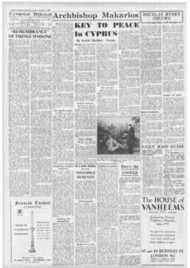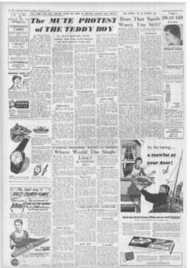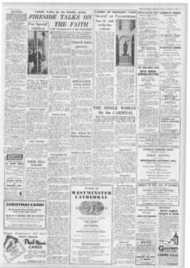Page 3, 4th November 1955
Page 3

Report an error
Noticed an error on this page?If you've noticed an error in this article please click here to report it.
Tags
Share
Related articles
'no Passing Glory
* Oriboomma141.41■41.4■4■41r41.4■41.4.410sa*
Greatness In The Air
Unafraid Of The Truth
The Light Of Many Suns: The Meaning Of The Bomb By...
CHESHIRE, V.C. : THE TURNING POINT CAME WITH THE FAITH
Sir Basil Embry
reviews
Andress, Hoyle's 'No Passing Glory' A NDREW BOYLE'S n,„. book "No Passing Glory " is a brilliant biography of Leonard Cheshire and will. I believe, survive the test of time. It was a real pleasure to read it.
Nevertheless, I wish he had allotted a little more space to the telling of the story of Cheshire's post-war activities and his great service to mankind, for here, indeed, is his lasting glory. I also wish he had made a deeper study of the mental, moral and spiritual side of Cheshire's postwar life, because is it not the fascinating side of the Cheshire story?
Cheshire emerged from the war with a brilliant record of achievement, and will undoubtedly go down to posterity as one of the great and really successful Bomber Squadron commanders of World War 11. He proved himself to be a man of great tenacity, resolution and courage; he applied a good brain, a keen intellect and an analytical mind to the practical problems of war in the air.
Bombing tactics
DERHAPS his most use ful contribution to the war was the application of his keen brain and his powers of observation to the analytical study of night-bombing tactics. The importance of this is manifest when it is realised that he was a member of a Bomber Command in which the key commanders took little or no active part in warlike operations and were, therefore, out of practical touch with the air war over Germany.
I can well appreciate his sentiments when he said (page 223): " I never could understand the normal Bomber Command method of planning an attack. Everything was wound-up and pre-set like an alarm clock hundreds of miles from a target, as if all the unknown factors could he predetermined infallibly and the raid conducted by the remote control of unseen experts.
" No battle in history was ever fought without a local commander to adjust his tactics to the needs of the situation.
" The system often went wrong and I fell in my wilder moments that even if it meant building an enormous aircraft for an Air Vice-Marshal azsai is staff we should have someone on the spot. Flexibility of tactics is as essential in an air as in a land or sea attack."
I believe his fearless and constructive criticism of the tactics and operational planning of Bomber Command not only improved the operational efficiency of the Command but had a profound influence on the morale of the aircrew throughout the Command.
Fearlessness
QIR CHARLES
t'.-) SYMONDS, the eminent neurologist, and an old friend of mine with whom I have had many long discussions on flying strain, has stated that Cheshire was 90 per cent. fearless and only 10 per cent. courageous.
I do not believe that the sensitive and spirited Cheshire portrayed in " No Passing Glory" was 90 per cent. fearless: I think he was just brave. His driving force, in my judgment, was courage of a high order, sense of duty and professional pride. I never met an airman in the war who was fearless about operational flying. In my experience the higher the intelligence and the greater the sense of duty the more did the airman conceal his inner feelings and emotions and appear to his comrades as a man immune from fear and apprehension.
When actually on art operational mission the airman of high calibre did not worry or brood about his fate, he applied his mind to the object in hand. and in my experience operational flying had an exhilarating effect.
Undoubtedly it had some effect on the nervous and mental systems of all airmen, depending, of course, on the nature of the missions, the hazards faced and the number carried out.
I would like to know to what extent operational strain affected Cheshire. Is there any relationship between it and his post-war work and faith?
I was particularly interested that reference had been made (page 169) to Cheshire suffering from anxiety neurosis caused by too little operational flying. Most operational commanders had experience of their aircrew showing symptoms of frustration and some depression during prolonged periods of inactivity due to weather or other causes.
The reason is that operational flying had a stimulating effect on the nervous system of a sensitive and highly strung airman, and when it was cut off it was like denying the drug to the addict
Rarer heroism
'MOW that Cheshire is a nationally known figure, many people seem to think that his transition from heroism in war to a heroism of a rarer and very different sort must have been a natural and easy one. That it was not so, and could not have been so, is brought out by the biography.
Cheshire had had a relatively conventional upbringing, and although the tremendous mental and physical strains of war-above all, war in the air-had revealed that he possessed certain exceptional attributes, he had no idea, at the end of the war, of what, if anything, he could do in time of peace. Hence the chaotic period during which Cheshire made false starts and mistakes. Something was lacking in his life.
That something was faith. The turning-point Was the moment when faith came to Cheshire, Mr. Boyle might perhaps in his hook-which is written with a sensitivity and an honesty worthy of its subject--bring out with even more emphasis that it was faith, a supernatural gift, which gave Cheshire a force like rocket-propulsion.
I would say bluntly that. if one considers that course of Cheshire's life. it is difficult to resist the conviction that the coming of faith to him was part of a divine pattern which was to affect the lives of many thousands, some of whom he would never See.
His vocation
FVEN when he had faith, the way was not easy, nor did he find his vocation at once. There followed a period of spiritual growth, a growth which involved many sacrifices and much suffering.
But after the advent of faith there were two objects in his life so important that all else paled into insignificance. He was determined to spread the faith by direct action and to succour suffering humanity. He wanted to serve God and his neighbour. not with part of his energies and for part of the time, but with every fibre of his being and for every moment of time.
How extraordinary and inspiring is the story of the early days of the Homes which he founded. Here are instances in which a steadfast faith achieved results which, humanly speaking, were apparently impossible.
It was this faith which carried him through so many dark hours when obstacles seemed to be insuperable, and through a long and dangerous illness.
Leadership
HAVE often been asked, during my service career, to give talks on leadership. I have tried to bring out the point that leadership for good demands moral attributes of a high order. Cheshire isI am proud to say this of a member of my own Service-an outstanding example of leadership for good.
He is selfless and single-minded, and is dedicated ID a noble lifework with an absolute passion. In a material age he stands for the values which are taught in the Gospels. Even in a broadcast talk, what he says, whilst not remarkable or brilliant, has by the force of his intense and burning faith the power to fire the imagination of thousands of listeners.
I heard recently some details of his plans for extending his work to India and the Far East-plans involving as much faith as those of St. Francis Xavier in those fields. By carrying his love of God and his neighbour into those regions he. has found a practical way of counteracting Communism thereof doing so perhaps in a more lasting way than is being done by some of our stopgap official organisations.
One of the most potent ways in which to fight Communism is to lead a Christian life and spread Christian principles. In this sense I have no hesitation in calling Cheshire one of the great apostles of the Church in modern times.
blog comments powered by Disqus









